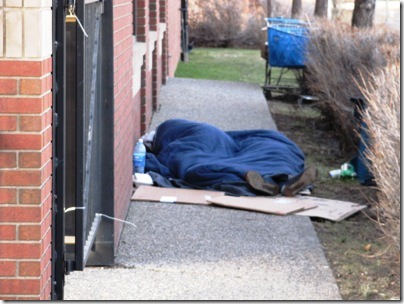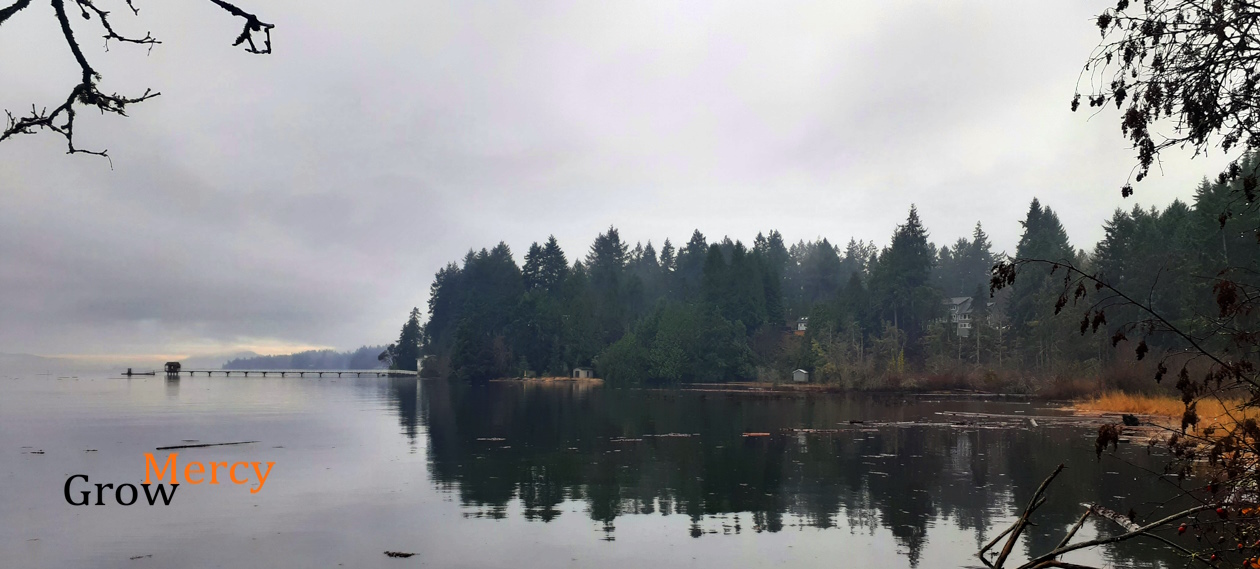A chilly morning breaks over the towers. I’m walking down 104 avenue waiting for purpose to catch up to me. Coming up on 110 street I see a couple beside Ceili’s. They are asleep under blankets. The traffic is still light but not for long. Soon they’ll be awake.
I wonder what will call them toward the day. Yesterday I talked to a man—matted by days of grime—begging for change. He was sitting on a bench on Jasper. When I gave him my change he showed me a Bible Society tract and pointed at the picture of Jesus that was on the front and said, "this is how I keep on." His speech was slurred but his face was solemn with sincerity.
 I walk toward the couple and take out my camera. A man in an orange vest picking up trash nearby laughs.
I walk toward the couple and take out my camera. A man in an orange vest picking up trash nearby laughs.
I’m warmed by the thought that they have each other. Of all the people I meet down here, most are scraped hollow by loneliness. It’s the same species of loneliness we all know about. But everyone is lonely in their own way; the children of loneliness each have their own twist and bend.
A man who wards off loneliness by clutching a bible tract is doing what he has to. Ask him his name, talk to him, slap him good naturedly on the back, a filling for a while, an untwisting for both of you, for a moment. And it matters. And more matters more.
—
Where I write this I hear Dylan’s It’s all over now, baby blue, and note the line, "The vagabond that’s rapping at your door is wearing the clothes that you once wore."
We judge ourselves by our downtown arenas, the relative smoothness of our roads, our access to shopping malls. We don’t judge ourselves by what we cast off. We don’t consider to work into the poll a loneliness quotient.

How do we live with this inequity? How should we live? What should our response be to the marginalization of the poor and the sick and the disabled and the minorities? What do we say to those who just want to live off the land instead of working in front of a computer but can’t because our natural world is being completely degraded and destroyed? What about those who want to farm in a way that is sustainable and not abysmally cruel to other species but cannot afford to because of the subsidies to industrial agriculture? How do we deal with this knowing that we are all complicit in the abuse of our natural world and that our own privilege is built upon the exploitation of others, other humans and other animals and the very land that sustains us? I’m taking a vow to only buy secondhand clothes from Value Village or thrift stores and maybe on rare occasions, new clothes from places I KNOW are ethically sourced. Its something… but is it enough? And even with this small step, I already know that I will not be as easily accepted by my friends as I would be if I just shut up about it and bought into the consumerism. We place judgments on each other based on the appearance of “newness” and the artificial construct of wealth. As if true wealth has anything to do with how nice your clothes are or your car or your house… I would trade it all for health and good food and land that was not poisoned by toxins.
Your questions are difficult and important. Even the best answers may fall short…so I’ll use the wisdom of someone who worked with the desperately poor her whole life: “We can do no great things; only small things with great love.” —Mother Teresa
We have far less control than we’d like to believe concerning the large picture. But there is far more significance in our small everyday actions than we imagine.
You, in your “small step,” are answering your questions. Do the little thing with integrity and love. It is from the perspective of small contemplative actions that the world and its confusions, and its haste and its waste is critiqued and judged and corrected. Much love Teryl.
I have the great privilege of being related to the two of you!
Modern life is overwhelmingly about management. Art Kleiner gives a good overview of the manner in which this came about in, ‘The Age of Heretics.’ Sometimes someone writes something that gives insight into our self-destruction…as well as a way out. In his book he states that corporations have the power to simply go ahead and to do what they do. But in the negation of that we find a way to free ourselves as well…to just go ahead and do what we do as people who couldn’t care less about what corporate society thinks. I made $5K on our hay sales last year. But I did feel that I have to buy a new truck, or go to the Bahamas on that $5K. This IS the place where I live…not some other. So who cares? This also meant that I can grow food for underprivileged, and walk out across my field in Value Village gear…and the plants and animals never gave me a second glance. (And who’d have figured on that?!)
I love your passion. Make it happen…
How can we work together?
Peace,
Craig
Sorry…
…I did NOT feel the need to buy a truck…
…and HOW may I get related to all of you? 😉
Ha! Craig! Well, of course in an important way we’re already related… Thanks as always for your wisdom. As far as working together…for a start, we need to continue to communicate the message of social care, earth care, and soul care. What you are doing with Haskap is profoundly important. Thanks for keeping us up to date.
To those listening in, here again are Craig’s links:
http://sharingthelittlepurpleberry.blogspot.com/
http://stlpbvoices.blogspot.com/
Also, if you want to be included on Teryl’s mailing list just send her a note: She’s currently working to make sure Bill c311 doesn’t get defeated. ( Teryl Berg )
A soul mate is one who “learns the music of your soul and sings it back to you when you forget the tune”. I feel I am among many soul mates.